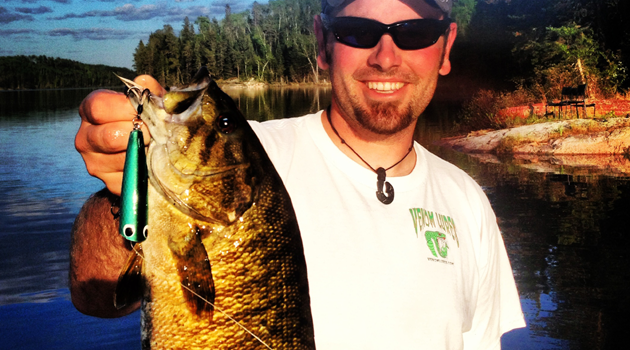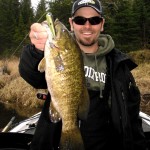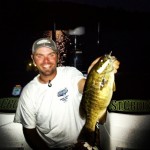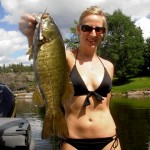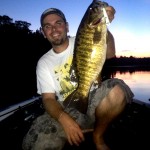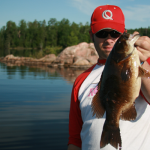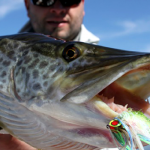By Josh B. Peacock
If you love to bass fish, chances are that love affair started with a topwater bait! I can personally recall numerous violent and awesome topwater strikes that happened more than a decade ago. Day dreaming of such events can often evoke goofy ear to ear grins. Try not to do that at work, people will think you are weird.
I have two go-to topwater baits over the course of a fishing season: a Rockpile Lures popper, and a walking bait, something like a Heddon Zara Spook or Lucky Craft Sammy. I have a few general rules of thumb about when, where and how to throw these baits in order to help you boat a few more bass this season.
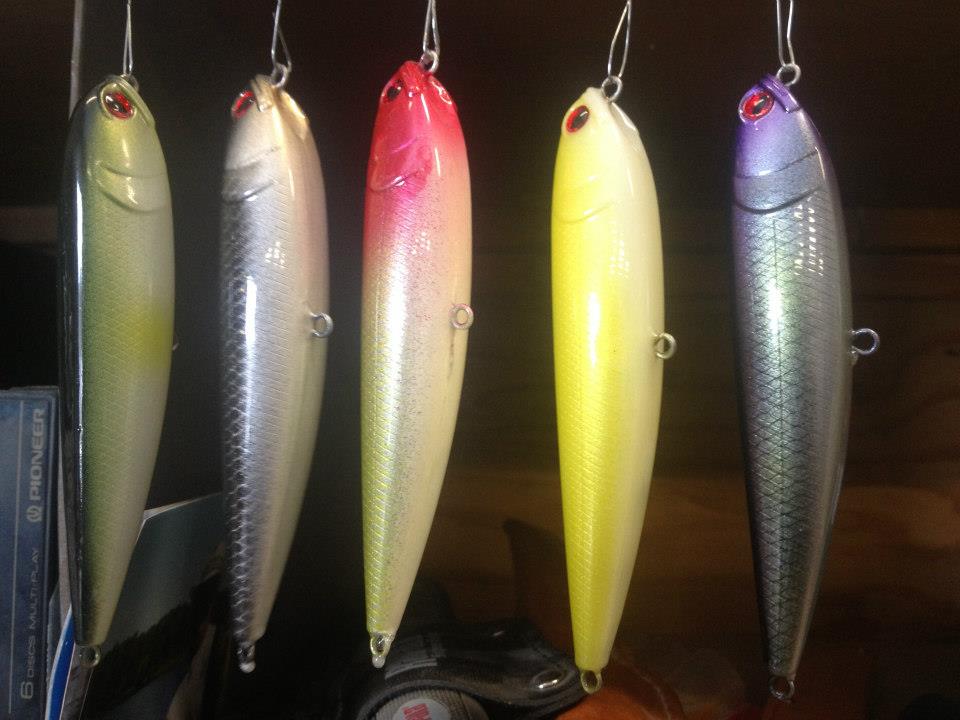
Poppers
A few key factors will allow you to excel with a topwater popper. The first is water temperature. I have caught fish extremely early on this type of bait, in cold water, down to 46 F in late April and early May. Optimal temperatures range from 48-65 F. Your cadence should match the temperature of the water. Long pauses and subtle slow pops at the bottom end of the temperature scale. The number one thing I see people doing wrong with a popper is working it too fast, especially early on in the season. Cast it out, wait for the rings to disipate, wait a bit longer, then make the first pop, count in your head if you have to. I will do this in a tournament to force myself to slow down, especially when I’m amped up first thing in the morning.
The second facet of popper fishing is presentation. A popper excels with the mindset that it is a finesse technique best suited for vertical presentations and target fishing. Cast to patches of cabbage weed, laydowns, deadheads, docks, large boulders, and rockpiles, thorougly work that piece of structure, try to keep your bait within a few feet of your target for as long as possible. Then wind it back to the boat, don’t bother working the open water outside of the structure, your wasting time, and sure to catch a slew of northern pike. I don’t know what it is, but they absolutely devour a popper bait that is worked quickly across the surface! My favourite setup is a St.Croix Avid Series casting rod (AVC66MF)- 6’6 medium action, something with a whippy tip to sling light poppers, with a solid backbone to control fish. I go old school when popper fishing and stll use 12-17 lb Vicioius X.A.C.T monofiliment line, first off it floats and gives the bait a nice action. If you use light line or fluorocarbon the line will sink and the bait will want to dive after each pull, and that’s no good!
Walkers
I personally feel that walking baits work best immediately after the spawn and then well into the fall, 65F on up, the warmer the better. Walking baits are notorious for putting big fish in the livewell not only smallmouth but largemouth too. That mesmerizing walk-the-dog cadence seems especially effective at coaxing lethargic postspawn female bass. Males may still be up guarding the beds but the females will have since pulled off and are hanging out in the 6-12 foot range, despite recovering from the rigors of the spawn they will often absolutely crush a walking bait. Most topwater walking baits come with bare treble hooks. Adding a feather dressed treble hook adds some realism to a bait that doesn’t look very good when not moving and also gives the fish a good target to zone in on.
A walking bait is an exceptional search bait and is made for a horizontal presentation. It allows you to effectively cover large flats and expanses of water. Focus in on points, rockpiles, sand flats, and weed flats or whenever fishing new water. Even if you don’t hook the fish, you will get a good look at it, and can throw a follow up bait like a senko or fluke to catch any short striking fish. Don’t get too hung up on colours, a white bellied baitifsh colour is hard to beat. I will switch to a translucent model if it’s a blue bird, sunny day, especially in gin clear water. My equipment for walking baits consists of the St.Croix Legend Tournament Topwater rod (TBC68MXF), paired with 12-14 lb test Vicious monofilmanet line. Long casts, and a sweeping hookset are key in battling hard fighting smallies back to the net, and this rod allows you to do just that. I prefer the forgiveness of monofilament to subdue a hasty hookset compared to that of braided line. I’ve tried braided line on topwaters and seem to loose or pull away from way too many fish.
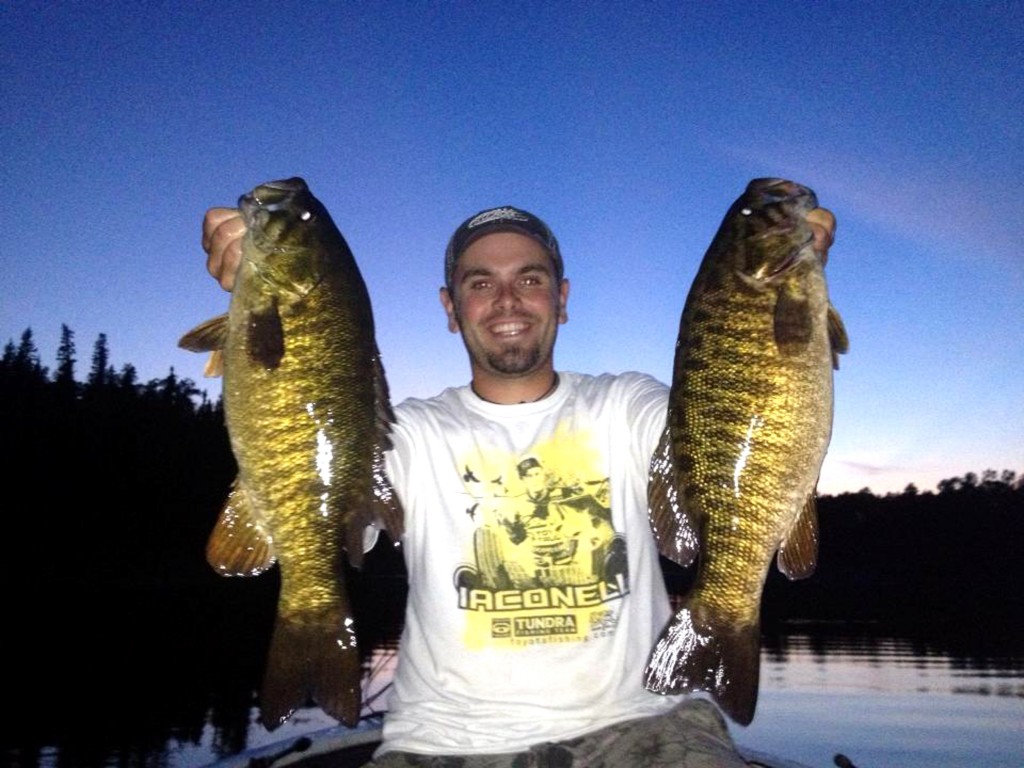
Rockpile Lures
All of this topwater talk takes me back to one evening after a dynamite day of topwater fishing. I lamented to my buddy Ron Achilles on how such a simple wooden lure could be so effective at catching bass, but also cost so much. At the time Rapala Skitter Pops were all the rage and a company named High Roller was making a high end wooden popper with premium hooks. A teenager at the time, with only enough money to own a handful of baits and lower end rods and reels I asked Ron “Couldn’t we just make our own? It can’t be that hard…” I should be clear here; I may have had the idea at the time, but the fabrication, and artistic design, rests solely on the shoulders of my buddy Ron Achilles. I got to do the fun stuff like field test the first Rockpile Lures prototypes on a school canoe trip as part of an Outdoor Education course. A bunch of my buddies helped test the first half a dozen baits including our buddy Eduardo who was our version of Fez from That 70’s Show, he hailed from Argentina and also caught a pile of fish that week. We were fishing virgin lakes in the spring, chuck a Rockpile Lures popper to an inflowing waterfall or creek and hold on, the results were legendary! And the rest as they say is history. The first ones were pretty crude with plain paint jobs, but they worked. Today’s Rockpile Lures have been field tested through countless hours and thousands of fish, handcrafted of cedar, boasting custom expertly airbrushed colours, and hand tied premium dressed treble hooks.
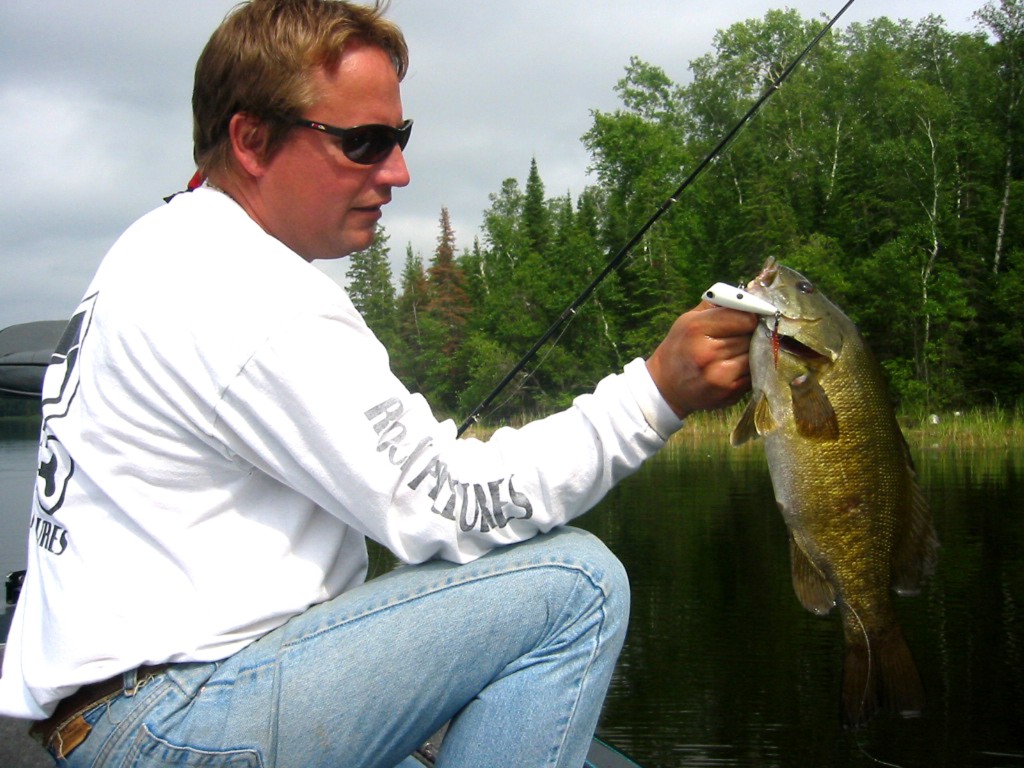
If you are looking to get your hands on one of these unique topwater baits, you can contact Ron directly @ 807-466-1699 or check out the Rockpile Lures Co Facebook page to see more photo evidence and the latest posts and updates!


